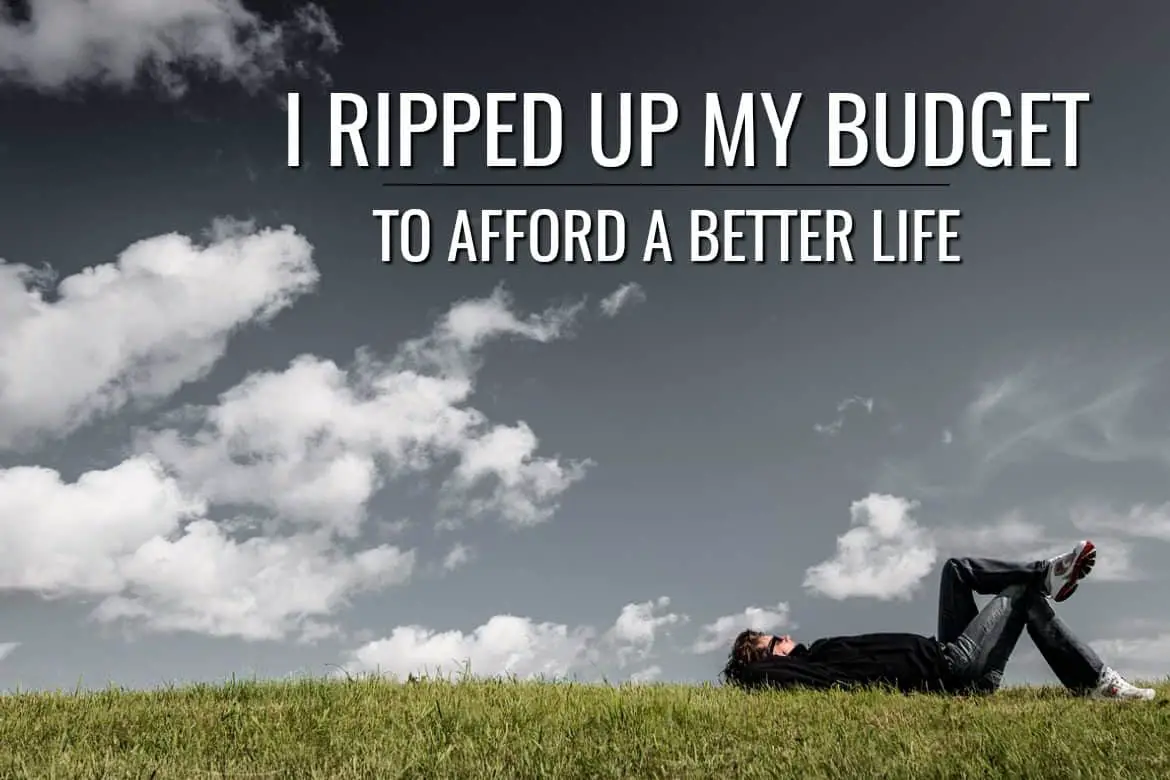“This post may contain affiliate links. Please read my disclosure for more info.
Have you ever watched trash being tossed into the back of a garbage truck? When the driver hits the compact button, he doesn’t know (or care) whether it’s crushing empty food containers or grandma’s antique rocker. The compactor pivots down and compresses everything into an unrecognizable mass of wood, plastic and rotting food.
Look around you. Almost everything you’ve purchased – your favorite shoes, your 60-inch smart TV, your books and your fine china will one day be pulverized with your neighbor’s coffee grinds and egg shells. The car you spent five years paying for will be pressed into a 2’x2’ cube of scrap metal.
We’d like to think the things we surround ourselves with are valuable. We exchange a big part of our life to accumulate all of it. So it’s hard to accept that when we’re no longer here, our most treasured possessions will be turned into landfill.
We work hard to afford a decent home, nice furniture, clothes, laptops, TV’s, cell phones and so on. So hard in fact, that most of us are in debt most of our lives paying for it all.
The most common regret people have at the end of life, is that they never lived the life they originally envisioned. Slowly and gradually, their focus shifted from the life they imagined to a series of short term, unrelated goals.
And then time was up.
Some of us do have a sudden financial epiphany. Maybe someone we know dies, and suddenly our own mortality comes to mind. Or someone we know who’s always seemed well off, loses their job and within a few months is in total financial meltdown. Seeing someone else suffer can sure make you reconsider your own choices.
But for most people, that clarity comes way too late.
We start earning and spending and become less focused on long term happiness, and more on “what do I need now?”
A decade passes. And then another. And one day we suddenly realize that time is up. The buzzer sounded and we’re still holding the ball.
Who really knows why we have such clarity at the end of life and not in our prime years.
Vice President Joe Biden said a few years ago, “Show me a man’s budget, and I’ll tell you what he values.”
When he said that, I was reminded of my own financial epiphany a few years earlier. After losing the mother of my children to leukemia, I was forced to re-evaluate a lot of things in my life, and one of them was my budget.
It was the first time I recognized that ours hadn’t reflected my values at all. Our budget was a bloated mess of furniture payments, car payments, restaurants, take-out food, and mall trips for clothes I didn’t need.
Nowhere in my budget were there any deposits to an emergency fund, or money spent on hikes or ski trips with the family, or running races, or on a blog that I had considered starting for years.
I realized that all along, I had the wrong idea of what a budget is. A budget shouldn’t be just a tool to document the money flowing out of your account. It’s not just a mathematical exercise.
A budget is a tool to make sure you’re directing your money toward the things you value.
It’s usually considered to be the first step towards financial independence someday. And it is.
But if we think of a budget only as a way to divide up debt payments, then maybe that’s how we allow ourselves to be lured, month by month away from what we value.
For some reason, we had let ourselves spend a decade acquiring stuff on credit until we could barely afford the payments. And when I looked around, none of it mattered.
The skis my wife and I each owned were still strapped on the garage wall, never used once in our entire eleven years together.
Ignorance really is bliss. Pouring over my bank statements that day, was like stepping on a scale after a couple years of pizza, beer, and no exercise.
It’s when I realized that the first step in creating a budget doesn’t involve a pencil or a keyboard. The first step is deciding what you value in life and how you can use money to provide that.
So How Can You Create a Value Based Budget?
It’s all about deciding what’s important to you. It’s not too late. Whether you’re working your first job, or you’re fifty with five kids. Think about how you spend both your money and your time.
Why do I mention time in the context of a budget?
Time and money are closely related. And sometimes we spend too much of one at the expense of the other.
- Maybe you’re working two jobs to pay for your car payment or credit cards.
- Maybe you’re a two income family but spend most of one salary on child support
- Or maybe your 60 hour work week has eliminated time with your kids or time at the gym.
- Maybe you need more time to work on a side hustle but your weekends are filled with an endless chain of chores and activities.
Some of the areas to consider when making your budget align more with your values:
- Your Career – Do you need more training or education to advance or make a career shift?
- Family time – Is your time always based around expensive activities, like shopping and dining out?
- Personal time – Do you have personal time, other than sitting on a train or in a car commuting?
- Health – Do you make time to blow off some steam? You need to for your physical and mental health.
- Living arrangements – What percentage of your take home pay do you spend on your mortgage or rent?
- Travel – Did you plan to travel? Where to? If you did, and you haven’t, what’s stopping you?
- Retirement – If you’re working and “cant afford” a retirement contribution, then you’re living beyond your means.
Related Topics:
- The Top 4 Money Myths Keeping Your Poor
- 3 Smart Money Moves to Make Tonight – Without Spending a Dime
- Work From Home – 20 Companies That Will Hire You to Work at Home
Here’s just a few of the things I found that we needed more, or less of:
No surprise…I needed more money each month.
For ten straight years, we had car payments, and for most of that time, we paid two car payments simultaneously. To finally eliminate the one remaining, I attacked our outrageous food budget, and then used the money I saved to throw every penny I could to pay it off. This saved us $476 per month.
By the way, Dave Ramsey has a pretty ingenious method to afford a decent car.
Our food budget was out of control.
The food budget I mentioned, was over $1000 per month for three people! When I say food, I mean groceries, take-out, restaurants and convenience stores. Most of the take-out food was because I had no food buying plan, and hurried through the store picking up whatever I thought we needed. At least twice a week, that resulted in a $25 take-out order. Once I nailed down a plan to buy food and actually gave thought to meals, we were able to save almost $400 per month.
I needed more time at home.
As a single parent, I was working 50 miles away. Then driving 80 mph home to grab the kids and make it to soccer practice. I was also worried about something happening during the day and being almost an hour away. Luckily, I was able to convince my manager to work from home. This saved me over $300 per month in gas, tolls and other expenses, and it really improved our family life.
I wanted to travel more and experience other places with my kids.
We had taken a few trips as a family, but they were charged on a credit card. Once I concentrated on eliminating every credit card balance, and my car payment, I was actually able to build up some savings. We’ve been to the Florida Keys, Mexico, the Bahamas, California and Savannah, Georgia in the last few years, all paid for in cash. I hope that by making the few trips we were able to, I was able to pique my kids curiosity to travel on their own.
We had no emergency fund
I could make excuses, and say that ten years of credit card payments, car payments, and out of control shopping left no money for an emergency fund. But really, there’s no excuse. Not having an emergency fund is one of the main reasons why it’s so difficult to eliminate credit card debt.
It’s also why I could never make my budget predictable. A budget is to direct money to your known expenses. Trying to pay for emergencies out of your monthly budget is just sabotaging yourself. The way I was able to build one up pretty quickly (and take it off my to do list) was by opening a Digit account. Every few days, Digit transfers a small amount from my checking to my Digit savings. So far, it’s bailed me out three times. Here’s my review, if you want to check it out.
I had skied a lot as a teenager but left it behind after starting a family.
Skiing isn’t cheap, especially if you don’t own your own equipment. I included this here because it’s a good example of an activity I used to love, that costs a little money, but got squeezed out and left behind in favor of debt payments. But just by drilling down to see where your money is going, and then making some value judgements, it becomes affordable. I’d much rather look back and remember our time on various mountains, than on three years of furniture payments.
In fact, here’s my kids on their first ski trip.
What are some of the activities you used to do, that you can’t seem to find the money or the time for anymore?
Final Points
We all need to budget, whether we’re making minimum wage or a million a year. It’s the only way to ensure that what’s going out is less than what’s coming in.
But things change. Jobs, family, health, priorities, wants, needs…
So unless we hold onto our values and say no to the things that don’t matter, we won’t be able to say yes to the things that do matter.
What’s important to you?
You still have time, but remember, the clock is ticking. Don’t be left holding the ball.


